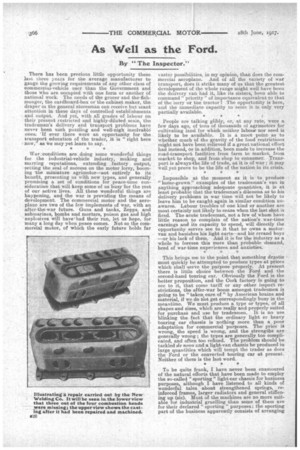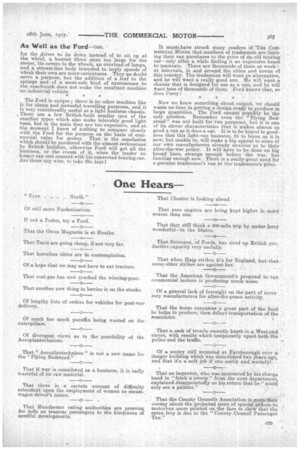• As Well as the Ford. By " The Inspector."
Page 2

Page 3

If you've noticed an error in this article please click here to report it so we can fix it.
There has been precious little opportunity these last three years for the average manufacturer to gauge the growing requirements of any other class of commercial-vehicle user than the Government and those Who are occupied with one form or another of national work. The needs of the grocer and the fishmonger, the cardboard-box or the cabinet maker, the draper oi the general storesman can receive but scant attention in these days of controlled establishments and output. And yet, with all grades of labour on their present restricted and highly-diluted scale, the tradesman's delivery and transport problems have ne•ver been such puzzling and well-nigh insolvable ones. 'If ever there were an opportunity for the transport education of the trader, it is " right here now," as We may yet learn to say.
War acoaditions are doing some wonderful things for the industrial-vehicle industry, making and -marring reputations, extending factory output,. setting the seal of success on the motor lorry, booming the miniature agrimotor—not entirely to its benefit, presenting us with new types, and generally promising a set of conditions for peace-time consideration that will keep some of us busy for the rest of our active lives. All these wonderful things are happening, and the war is providing the means of development. The commercial motor and the aeroplane are two of the few implements of war, with an after-th&avar future. Guns and tanks, Zepps. and submarines, bombs and mortars, poison gas and high explosives will havchad their run, let us hope, for many a long day when peace comes. Not BO the commercial motor, of which the early future holds far
vaster possibilities, in my opinion, than does the commercial aeroplane. And of all the variety of war transport, does it strike Many of us that the greatest development of the whole range might well have been the delivery van had it, like its sisters, been able to command " priority " of importance equivalent to that of the lorry or the tractorl The opportunity is here, and the immediate capacity to seize it is only very partially available.
People are talking glibly, or, at any rate, Were a few days ago, of tens of thousands of agrimotors for cultivating land for which neither laboar nor seed iS likely to be available. It is a moot, point e as to whether mach of the gravity of the food restrictions might not haVe been relieved if a great national effort had instead, or in addition, been made to increase the road-transport facilities from farm to market, from market to shop, and from shop to consumer. Transport is always-the life of trade, an it is of war ; it may well yet prove to be the life of the nation in its crisis.
Impossible at the moment as it is to produce "home-grown" examples of the tradesman's van in anything approaching adequate quantities, it is at. least probable that the tradesman's dilemma as to his delivery problems in war • time will not be likely to leave him to be caught again in similar condition unawares. Labour troubles of one kind or another are most certainly not likely to cease when the last shot is fired. The acute tradesman, not a few of whom have little reason to complain of the nation's war-time earnings and its capacity to spend, will directly the opportunity serves see to it that he owns a motorvan and banishes his light carts—and hie errand bays —or his lack of them. And it is for the industry as a whole to foresee this more than probable demand, bred of war-time experiences and anxieties.
This brings me to the point that something drastic must quickly be attempted to produce 'types at prices which shall ,serve the purpose properly. At present there is little choice between the Ford and the second-hand touring ear. Obviously the Ford is the better proposition, and the Cork factory is going to see to it, that come tariff or any other import restrictions, the after-war boom amongst tradesmen is going to be " taken care of" by American brains and material, if we de not get correspondingly busy in the meantime. We must produce a type or types, of all shapes and sizes, Which are really and properly suited for purchase and use by tradesmen. It is no use. blinking the fact that the ordinary light or heavy touring car &anis is nothing more than a poor adaptation for commercial purposes. The price is wrong, the speed is wrong, and the strengths are generally wrong ; the types are generally too complicated, and often too refined. The problem should be tackled de ?wen and a light-van chassis be produced in large quantities which will tempt the trader as does the Ford or• the converted touring car at present. Neither of them is the last word.
To be quite frank, I have never been enamoured of the natural efforts that have been made to employ the so-called " spotting " light-car chassis for business purposes' although I have listened to all kinds of wonderful tales about strengthened springs, reinforced frames larger radiators and general stiffening up (sic). Vogt of the machines are no more suitable for industrial gruelling than some of them are for their declared" sporting" purposes: the sporting part of the business apparently consists of arranging for the Ariver to lie down instead of to sit up at the wheel, a bonnet three sizes too large for the motor, tin covers to the wheels, an overload of lamps, and a. stream-line body intended to imply speeds of which their own. are mere caricatures. They no doubt serve a purpose, but the addition of a leaf to the springs and of a meat-safe kind of excrescence to the coachwork does not make the resultant machine an industrial vehicle.
The Ford is unique ; there is no other machine like it for cheap and powerful travelling purposes, and it is very considerably useful as a light business chassis. There are a few British-built smaller cars of the sturdier types which also make tolerably good light vans, but in the main they are too expensive, and at the moment I know of nothing to compare closely with the Ford for the purpose on the basis of commercial value for money. That. is the conclusion which should be pondered with the utmost seriousness, by British builders, otherwise Ford will get all the business, or the cream of it, when the trader no longer can rest content with his converted touring car. Are there any wise, to take the hint? It mustahave struck many readers of THE Commama. Moron that numbers of tradesmen are limiting their van purchases to the price of an old touring car—only after a while finding it an expensive beast to maintain. There are' thousands, of them at work--at intervals, in and around the cities and towns of this country. The tradesman will want an alternative, and he will want a really good one. He will want a chassis that is designed for use as a van, and he will *ant tens of thousands of them. Ford knows that so does Perry!
Now we know something about output, we should . waste no time in getting a design ready to produce in' large quantities. The Ford cannot possibly be' the only solution. Remember even the "Flying Bedstead" was not built for'van purposes but it is one of its clever characteristics that it 'makes almost as good a van as it does a car. It is to be hoped to goodness that this light-van business,, fit to boom as it is now, but unable to will make a big appeal to some of our own manufacturers already anxious as to their• after-the-war policy. It will have to be done on big broad lines, strange enough before the war, but familiar enough now. There is a really-great need for a genuine tradesman's van at thetradesms.n's




















